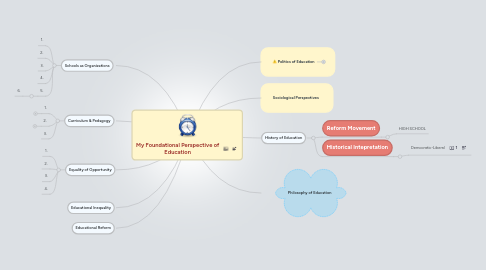
1. Politics of Education
1.1. Progressive Vision - page 26
1.1.1. 1. Schools are central to solving social issues.
1.1.2. 2. Vehicle for upward mobility.
1.1.3. 3. Integral part of a democratic society
1.2. 5. Unequal Educational Performance - 28 - individual students begin school with different life chances; some groups have many more advantages than other groups; policy and programs must equalize the playing field
1.2.1. Achievement Gap
1.2.2. Example: achievement gap
1.3. Liberal Perspective
1.3.1. 6. Educational problems - 29 - schools limit the life chances of poor & minority children; too much emphasis is placed on discipline and authority; zip codes influence achievement; traditional curriculum does not address the pluralistic society in which we live
1.3.1.1. Urban education
1.3.1.2. Example: urban education
1.3.1.3. Socio-economic status - money matters!
1.3.2. 7. Educational policy & reform - 30- quality and equality of opportunity; improve failing schools; decentralize schools; public choice; programs for disadvantaged groups; curriculum balance of diverse perspectives
1.3.2.1. Question: charter schools?
1.3.2.2. Funding is a big issue here
1.3.3. 8. The American Dream - 32- social and political functions of schooling; public education for the masses; have not met the needs for marginalized students in education regarding access to quality education, opportunity, and success
1.3.3.1. Such things as multicultural education can alleviate the limits
1.4. 4. Role of School - page 27- balance needs of society; democratic and meritocratic; ensure equality of opportunity exists and inequality be minimized.
1.4.1. Meritocracy can only work if everyone has the same opportunities.
1.5. Purpose of Education
1.5.1. The social purpose of education is for students to question current practices and institutions in order prepare educated citizens who can undertake actions that spark change.
1.5.1.1. "socialization" - a key ingredient to a stable society
1.5.1.2. social cohesion; socialize children into the various roles in society;
1.5.1.3. This speaks to how we socialize children for certain roles in society. Do schools reproduce the social stratification in the U.S. through the educational institutions via tracking, teacher quality, even the physical place of school?
2. Schools as Organizations
2.1. 1.
2.2. 2.
2.3. 3.
2.4. 4.
2.5. 5.
2.5.1. 6.
3. Educational Inequality
4. Curriculum & Pedagogy
4.1. 1.
4.1.1. Project specifications
4.1.2. End User requirements
4.1.3. Action points sign-off
4.2. 2.
4.2.1. Define actions as necessary
4.3. 3.
5. Equality of Opportunity
5.1. 1.
5.2. 2.
5.3. 3.
5.4. 4.
6. Sociological Perspectives
7. Philosophy of Education
8. History of Education
8.1. Reform Movement
8.1.1. HIGH SCHOOL
8.2. Historical Intepretation
8.2.1. Democratic-Liberal
